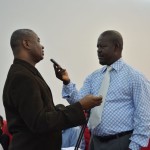Rumor Has It Journalists Can Help Clear the Air
By Naoko Udagawa
“Ambon is like a paradise.” This is how a local Search for Ground Common staffer described the capital city of Maluku Province, in Indonesia. Despite the beauty of the Maluku islands and the region’s famed local seafood, ikan bakar, Ambon has been a conflict zone since 1999 when sectarian conflict between Muslim and Christian communities broke out.
The conflict is much less intense now compared to the heady days following the fall of Suharto’s authoritarian regime, which governed Indonesia for more than 30 years. Tension, however, is easily sparked in Ambon.
In the September of last year, rumors that a Muslim ojek (motorcycle taxi) driver had been tortured and killed by Christians resulted in renewed violence. Seven people died and many more were injured in the conflict. More than 200 buildings were destroyed and 4,000 people displaced.
Local media outlets played a leading role in spreading the rumors about the initial incident. Recognizing the influence of the media in worsening conflict and the potential role it could play in preventing conflict in times of tension, SFCG held a rumor-management training workshop for local media in June. Thirty-eight journalists and other media representatives took part in the two-day workshop which brought participants from different religious backgrounds together.
Many residences in Ambon still suffer from memories of the conflicts that decimated the region post-Suharto. Ongen Lekipiouw, a 28-year-old journalist who participated in the workshop, was injured by a bomb in the conflict. He almost died and was in a coma for four months. He said he thanked God for saving his life, but he still remained traumatized. “People here are haunted by conflict and violence.”
Ongen said that participation in the workshop gave him hope that people in Ambon would again be united. He was grateful that journalists of different religious beliefs participated together in the workshop.
He is convinced that if Christian and Muslim journalists, who have long been divided, can communicate as professional journalists irrespective of religion, race, and class, interreligious conflict due to uninvestigated rumors will be a thing of the past. Further, Ongen said that
“Because of this training, we can better analyze problems which might cause conflict and acknowledge how to search for other roads to the problems. That is what SFCG has given us.”
This project illustrates how a short workshop can have a significant impact. By simply providing a space for interaction between journalists of different backgrounds, these sessions can help break down fears and stereotypes. At the beginning of the workshop, participants sat separately and divided into religious groups. But after the ice broke, they grew more comfortable with each other and began to mix.
After the workshop , before our team departed Ambon for Jakarta, we visited a monument for peace in Ambon — a ‘world peace gong’ covered in flags from all over — to express our wish for a lasting peace in the Maluku islands. We then went on to the airport. Boarding our flight, I hoped that one day in the near future I would be able to explore the region’s beautiful islands more fully and find an Ambon at peace with itself.
Naoko Udagawa is a MIA candidate at the School of International and Public Affairs at Columbia University (SIPA). She recently completed an internship with SFCG in Indonesia.












